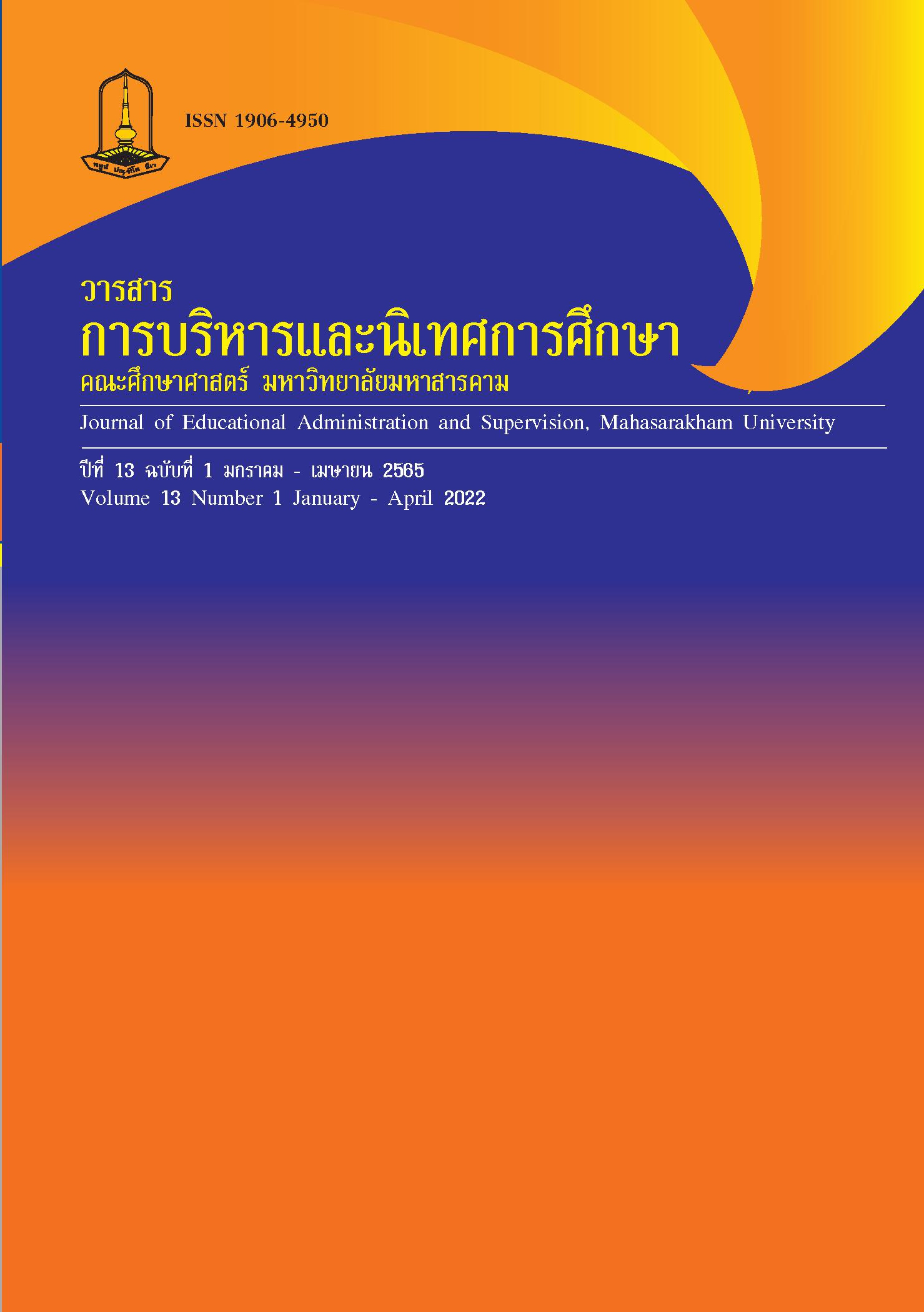Factors Affecting Classroom Research Conducting of Teachers Under The Yasothon Primary Educational Service Area Office 2
Main Article Content
Abstract
This research aimed: 1) to study the research conducting factors of teachers; 2) to study classroom research conducting of teachers under the Yasothon Primary Educational Service Area Office 2 ; 3) to investigate the relationship between the research conducting
factors and classroom research conducting of teachers under the Yasothon Primary Educational Service Area Office 2; and 4) to investigate the research conducting factors affecting classroom research conducting of teachers under the Yasothon Primary Educational Service Area Office 2. The research samples consisted of 327 school administrators and teachers in primary school under the Yasothon Primary Educational Service Area Office 2, which were obtained by stratified random sampling technique. The research instrument was a five-rating scales questionnaire with the 0.89 of reliability of research conducting factors,
and 0.80 of classroom research conducting of teachers. The statistics used in analyzing data were mean, standard deviation, Pearson’s product moment correlation coefficient, and stepwise multiple regression. The research results were: 1) the factors of conducting research in overall and each aspect was at a high level. The aspects ranked by mean from high to low were research
conducting motivation, to be respected, knowledge of research conducting, competences and skills of research conducting, and supporting of research conducting respectively ; 2) the classroom research conducting of teachers in overall and each aspect was at a high level. The aspects ranked from high to low were writing of the results and research report, data analysis, data collection, research problem determination, and research planning respectively; 3) the research conducting factors and classroom research conducting of teachers under the Yasothon Primary Educational Service Area Office 2 were correlated positively at a high level with.01 statistical significance; and 4) the research conducting factors in the aspect of supporting of research conducting (X4), research conducting motivation (X3), and knowledge of research conducting (X2) together predicted classroom
Downloads
Article Details
References
ดรณี ปะสังติโย, ศิริ ถีอาสนา, และเกียงศักดิ์ ไพรวรรณ. (2555). การพัฒนาครูด้านการทำวิจัยในชั้นเรียนโรงเรียนบ้านเหล่าสำนังานเขตพื้นที่การศึกษามหาสารคาม เขต 2 โดยใช้หลักการวิจัยเชิงปฏิบัติการ. วารสารมหาวิทยาลัยราชภัฏมหาสารคาม, 6(3), 67–74.
บุญชม ศรีสะอาด. (2560). การวิจัยเบื้องต้น. พิมพ์ครั้งที่ 10. กรุงเทพฯ: สุวีริยาสาส์น.
ปราณี สีลาโคตร, ไพศาล วรคำ และอรัญ ซุยกระเดื่อง. (2554). การวิเคราะห์จำแนกปัจจัยที่ส่งผลต่อการทำวิจัยในชั้นเรียนของครูผู้สอนสังกัดสำนักงานเขตพื้นที่การศึกษาร้อยเอ็ด เขต 3. วารสารมหาวิทยาลัยราชภัฏมหาสารคาม, 5(2), 92-94.
ประสาท เนืองเฉลิม. (2556). วิจัยการเรียนการสอน. พิมพ์ครั้งที่ 2. กรุงเทพฯ: สำนักพิมพ์แห่งจุฬาลงกรณ์มหาวิทยาลัย.
พูลสุข สังข์รุ่ง. (2550). มนุษยสัมพันธ์ในองค์การ. พิมพ์ครั้งที่ 10. กรุงเทพฯ: บี เคอินเตอร์ ปริ้นท์.
สำนักงานเขตพื้นที่การศึกษาประถมศึกษายโสธร เขต 2. (2561). ข้อมูลพื้นฐาน. สืบค้นข้อมูลวันที่ 10 กรกฎาคม 2563. จาก http://www.yst2.go.th/web/?page_id=3702.
สำนักงานคณะกรรมการการศึกษาขั้นพื้นฐาน. (2552). คู่มือแนวทางการดำเนินงานตามนโยบายเรียนฟรี15 ปี อย่างมีคุณภาพ. กรุงเทพฯ: สำนักงานคณะกรรมการการศึกษาขั้นพื้นฐาน.
สำนักงานเลขาธิการสภาการศึกษา. (2560). นโยบายแผนการศึกษาชาติ. สืบค้นข้อมูลวันที่ 10 กรกฎาคม 2563. จาก http://www.onec.go.th/index.php/page/view/Outstand/2532
สุวิมล ว่องวาณิช. (2554). การวิจัยปฏิบัติการในชั้นเรียน. พิมพ์มครั้งที่ 14. กรุงเทพฯ: จุฬาลงกรณ์มหาวิทยาลัย.
อัญชลี สันห์ลักษณ์. (2557). ปัจจัยที่ส่งผลต่อการทำวิจัยในชั้นเรียนของครูสังกัดสำนักงานเขตพื้นที่การศึกษาประถมศึกษากาญจนบุรี เขต 4. วารสารการวิจัยกาสะลองคำมหาวิทยาลัยราชภัฏเชียงราย, 8(1), 115-123.
Bloom, B.S. (1971). Hand book on Formative and Summative Evaluation of Student Learning. New York: Mc Graw-Hill Book.
Eisenberger, R. (2002). Perceived Organizational Support: A review of the Literature. Journal of Applied Psychology, 87, 698-714.
Rhoades, L. (2001). Affective Commitment to the Organization: The Contribution of Perceived Organizational Support. Journal of Applied Psychology, 86(5), 825-836.


